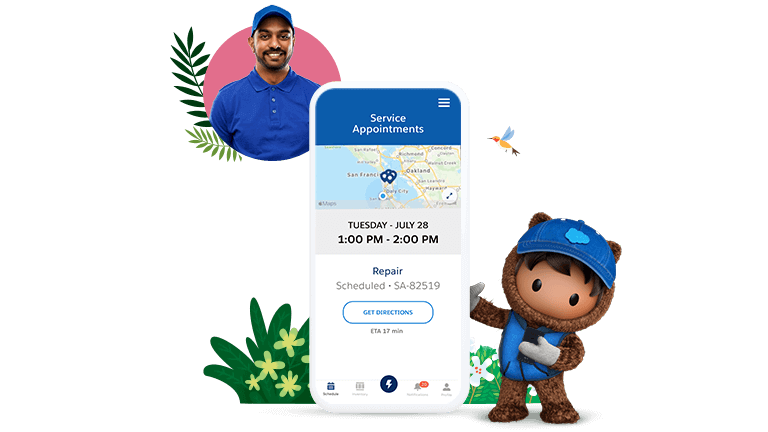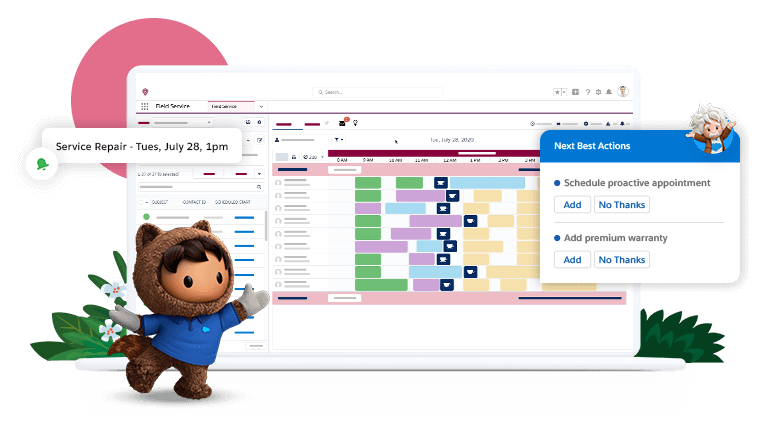What is Field Service Management?
Learn how to connect your teams, optimize operations, and improve customer experience with AI.
In its simplest form, field service refers to any service work that is performed at a customer’s location. Use cases span industries, from performing preventative maintenance on a machine at a hospital, to building city infrastructure, to fixing your cable connection at home.
Field service is often the only direct interaction a customer has with a company. Because of this, interactions are critical to retention and loyalty. That’s why 86% of decision makers at organizations say that it’s critical to scaling their business.

86% of decision makers at companies with field service say it’s critical to scaling their business.
"Power Your Frontline Workforce", Salesforce Research, December 2022

What is field service management?
Field service management is the system organizations use to coordinate resources to deliver service outside of their company property. There are many use cases including equipment installation, maintenance, break/fix, and asset monitoring. Performing these jobs takes careful coordination between agents, dispatchers, frontline workers, and others.
Today’s field service management keeps mobile workers and customers connected with AI + data + CRM. Here are three important functions it provides:
1. A complete view of data in your CRM
Field service management centralizes information into one CRM. Everyone is connected on the same CRM system and data is available in real time on any device.
With a complete view of data, field service organizations unlock cross-department productivity. It breaks down departmental silos as teams share expertise and centralize knowledge. They collaborate on the same platform in real time. As a result, the likelihood of a resolution improves because everyone has the information they need.
2. Optimized operations with AI
3. Contract visibility
Organizations gain insight into service contracts to ensure the right level of service. The system then assigns the tasks of updating the contract and billing information. This type of solution can even enable field service teams to generate new revenue. As a trusted expert, a frontline worker can also offer cross-sell opportunities.
From intelligently scheduling employees and contractors to assigning work and providing complete visibility into service operations, field service management helps companies to deliver better service to customers anywhere and from any device. This is why having the right solution matters to your business, workers, and customers.

Who benefits from field service management?
Contact center agents
With a complete view of the customer, contact center agents personalize every interaction. That matters when 73% of customers expect companies to understand their unique needs and expectations.
Support agents access knowledge base articles and use automated workflows. Meanwhile, AI works behind the scenes to improve their responses and recommendations. If agents can’t find what they need, they can collaborate to resolve complicated requests.
If a customer needs help with a simple task — such as how to reboot a piece of equipment — agents can troubleshoot with visual remote assistance. Agents launch a video session that becomes a two-way interactive experience. The agent sees the object in real time and guides the customer through directions. If the customer needs more support, the agent connects them to a skilled technician.
Dispatchers
Gone are the days of using whiteboards to map schedules. Field service management automates the entire scheduling process for dispatchers. So, when dispatchers go to schedule an appointment, the system recommends the next available field service mobile worker with the right expertise for the job.
If schedules change unexpectedly, field service management sources a replacement. Or if the customer cancels, the system adjusts schedules with the help of automation. It reassigns the field service mobile worker to a new job that requires similar skills, tools, and equipment.
These capabilities help dispatchers to be more efficient and free them up to focus on more complex work. They also remove any bias that would have otherwise come from manual scheduling. Workloads are better balanced and every employee and contractor has a shot.
Field service mobile workers
With the right technology, field service mobile workers no longer feel disengaged from the office. They have mobile devices that provide a real-time view of data. From their mobile app, they can review schedules, recommended routes, and key customer information. They can also ensure they have the right tools and equipment on the truck before they head out for the day.
Online and offline mobile capabilities give them what they need, even in remote locations. They can access knowledge articles, workflows, and tasks lists. They can also add notes, which sync with the field service management system. If a problem is outside of their expertise, they can connect with an expert with visual remote assistance.
Time with the customer also provides a way to naturally cross-sell and upsell opportunities. The field service mobile worker can help customers upgrade equipment or service contracts from their mobile device. Or, they can hand the customer over to a sales rep for more complicated requests.
Contact center managers
Contractors
Customers
Eighty-eight percent of customers say the experience a company provides is as important as their products or services. But field service organizations are learning that customers have even higher expectations to meet. Customers expect field service to fit into their schedules, and clear communication and complete transparency matters from the start.
Field service management gives customers the control and convenience they crave. They can schedule their own appointments from a portal, website, or app. On the day of service, they get updates with capabilities like appointment assistance so that no one is waiting around. This includes reminders on their appointment times, details on who will be coming, and their estimated time of arrival. Customers get updates on the channel of their choice.

How to choose the right field service management solution
Is the implementation straightforward?
How easy is it to use?
Can it handle third-party support?
Is it mobile-first?
Does it provide real-time data?
Is it scalable?

Field Service Trends Leaders Should Know Today

5 Essentials for Successful Contractor Management

Salesforce Field Service
More resources

Fix Problems Before They Happen with This Field Service Strategy

The 5th State of Service Report




